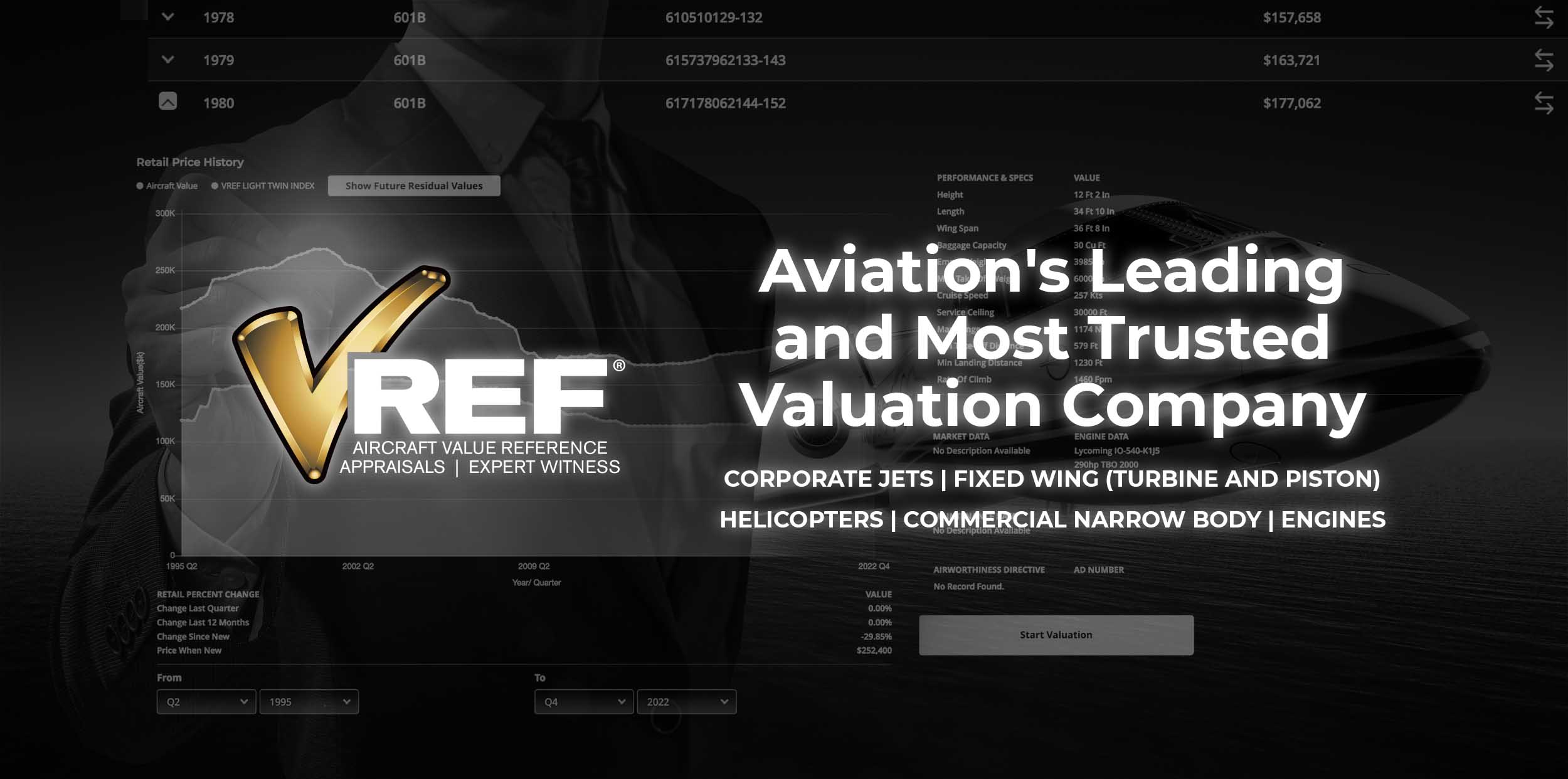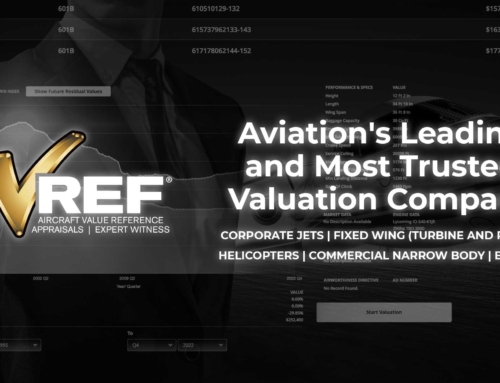Are you considering the use of an appraiser for your potential aircraft purchase? Or maybe you require a current fair market value of your aircraft for insurance or estate planning purposes.
First, let’s start with one shocking fact. When it comes to personal property, almost anyone can call themselves an appraiser. And this is because there is no license to obtain, nor is one required for personal property appraisers in the U.S. There is also no such thing as a “certified appraiser.” Regardless of what a company’s website says or how an appraiser presents themselves to you, a certified appraiser does not exist.
An appraiser in the real estate industry must indeed have a license. However, the same does not apply to the aviation industry as aircraft are personal property. And this is why it’s critical to ensure your aviation appraiser is the best in the business and verify they have the proper credentials and experience with the aircraft type you are dealing with.
We’ll take a look at the American Society of Appraisers (ASA). Plus, we’ll review an Accredited ASA Appraiser and why choosing one is the optimal choice.
Why Use An ASA Accredited Senior Appraiser?
Simply put, using an ASA Accredited Senior Appraiser ensures that the appraisal follows a special set of standards, methodology, and ethical guidelines. Furthermore, these professional and ethical regulations are set to the highest standard, which falls under USPAP. More on USPAP later on.
All this to say, an ASA Accredited Senior Appraiser knows what they’re doing. Also, they provide a wealth of knowledge regarding the property, whether it’s real estate or personal. Moreover, the ASA is the highest level of training with the highest level of a proven methodology. Basically, having an ASA designation is equivalent to a Ph.D.
What Is The ASA?
If you’re unfamiliar with the ASA altogether, it’s important to realize that the ASA is an internationally recognized organization of professional appraisers. Furthermore, the ASA offers accreditations in several disciplines. These range from gems and jewelry to machinery and personal property. Aircraft fall under the MTS (Machinery and Technical Specialties) category within the ASA. The ASA is the only international association with both an aircraft specialty training program and one that covers all aircraft types, not just commercial. When it comes to General Aviation aircraft, the ASA is the only association that offers training.
The ASA was officially established in 1952 in Delaware. Since then, the ASA continues to set a standard of professionalism and ethics for appraisers of all kinds. Of course, this is essential in an industry with no official set of standards in place.
Appraisers who earn their accreditation within their discipline through the ASA rely heavily on its strict code of standards, ethics, and conduct. This ensures the public receives reliable and accurate information from appraisers with an ASA accreditation.
When you see the letters ASA after someone’s name, that means they are a current member of the ASA as well as a designated Accredited Senior Appraiser. To verify the appraiser is not misrepresenting themselves, get in the habit of checking out the ASA website. You can click this LINK to search for your appraiser’s name. If they are not listed, they are not an ASA. Because no one is policing the use of the ASA designation, it is up to the public to report ethics violations to the ASA.
Aircraft Valuation Program
An appraiser in the aviation discipline does so within the Machinery and Technical Specialties (MTS) category. Many people starting to earn their designated will need to complete rigorous training, testing, and a minimum of 5 years of appraisal work. There are four professional aircraft appraising programs available through the ASA. And each of them requires extensive experience within the industry. Moreover, it requires training and other coursework material to complete the program.
The four programs available for aviation in sequence are:
- ME201-ACS
Introduction to Machinery and Equipment Valuation (Aviation Specific) - ME202-ACS
Machinery and Equipment Valuation Methodology (Aviation Specific) - ME203-ACS
Machinery and Equipment Evaluation – Advanced Topics in Aircraft Appraisals I - ME204-ACS
Machinery and Equipment Evaluation – Advanced Topics in Aircraft Appraisals II
There are two designations you can achieve as an accredited appraiser within the aviation industry. One is being an Accredited Member (AM). The other is being an Accredited Senior Appraiser (ASA). An AM is in training to earn their ASA designation, and these appraisers can be looked at as apprentices in training.
The final two programs are truly for those who wish to go beyond the AM level. People at this level often work as aircraft brokers, appraisers, and other professionals in aviation. Also, others interested in the courses would include individuals in banking, financing, and the aircraft maintenance industry.
What Are The Requirements To Become An ASA Accredited Senior Appraiser In Aviation?
As stated before, becoming an ASA Accredited senior Appraiser takes a lot of work and is no easy venture. There are prerequisites to even apply for the program itself. Then, you face an extensive amount of work to complete the program.
Some requirements are, but are not limited to:
- Proof of qualifications
- Required testing and coursework
- USPAP training and compliance
- Hands-on experience
- Participation in ongoing continued education
- Report writing
- Full-time appraisal practice
Questions People Need To Ask Appraiser
Needless to say, purchasing an aircraft is no small investment. Especially if you’re new to aviation, chances are you’re looking forward to owning your first aircraft. But finding a trustworthy appraiser can be difficult if you don’t know what you should be looking for. So think of it as insurance and ask the questions you need to make sure you’ve found someone truly reliable.
Here are some things you should ask an appraiser:
A Referral List
First, receive a referral list. Then call around to see what others have to say about the appraiser you’re considering. Listen carefully and take in any information you find necessary for your aircraft.
Demonstration Of Qualificaitons
Then, get a demonstration of an appraiser’s qualifications, ask for a C.V and make sure they are competent for your aircraft type.
Proof of USPAP Compliance
The Uniform Standards of Professional Appraisal Practice was first developed in the 1980s by a joint committee representing the major U.S. and Canadian appraisal organizations. As a result of the savings and loan crisis, the Appraisal Foundation (TAF) was formed by these same groups, support, and input from major industry and educational groups, and TAF took over the administration of USPAP. While USPAP provides a minimum set of quality control standards for appraisal in the U.S., it does not attempt to prescribe specific methods to be used. Rather, USPAP requires that appraisers be familiar with and correctly utilize those methods which would be acceptable to other appraisers familiar with the assignment at hand and acceptable to the intended users of the appraisal. USPAP directs this through what is called the Scope of Work rule. At the onset of an assignment, an appraiser is obligated to gather certain specified preliminary data about the project, such as the nature of the property to be appraised, the basis of value, the interests or assets appraised, important assumptions or hypothetical conditions, and the effective date of the valuation.
More importantly, USPAP provides a set of standards and Advisory Opinions and updates them every 2 years. Any appraiser in the USA doing work for financial institutions should be USPAP compliant and prove it. USPAP compliance is in the form of a Certificate of Completion, and any appraiser that is asked to demonstrate compliance should be able to provide their certificate immediately. More importantly, no tribunal looks for USPAP non-compliance. It is up to the client to ask for compliance and steer clear of anyone who can not provide it.
USPAP Certification statements appear in every proper appraisal. The appraiser states that they comply. The report is accurate and free of ethics violations, including the appraiser has no vested interest in the property being appraised. This is critical as anyone selling appraisals should not be selling or buying aircraft. Let me repeat this, your appraiser should be an appraiser, not an aircraft salesman, or an aircraft broker, or working for an aircraft broker or dealer.
Proof Of Insurance
Next, ask them for proof of professional liability insurance as well as Errors and Omissions insurance. VREF carries a 10 Million Airport Liability policy, and it is not cheap!
List Of Recently Completed Appraisals
Then, ask for an audited or verified list of the number of appraisals completed within the calendar year. There is nothing to be ashamed of when asking an appraiser to demonstrate their capabilities. After all, you are spending a lot of money on professional services.
Use An ASA Accredited Senior Appraiser For Your Aviation Needs
With thousands of aircraft appraisals under our belt every year, our team of Accredited Senior Appraisers is the way to go when it comes to making an intelligent and informed decision. Our data-backed appraisals are at the core of our entire business. And we continue to help aviation professionals. As well as banks, financial institutions, and more with accurate, unbiased data.
Of course, there are other programs and businesses out there that provide aviation appraisals. However, we’ve perfected our craft with 27 years of producing aircraft appraisals our clients can rely on. There’s no need to feel uncertain or apprehensive about an appraiser you’re trusting to complete your appraisal with the utmost level of professionalism.
Contact us today about your aviation appraisal needs.



